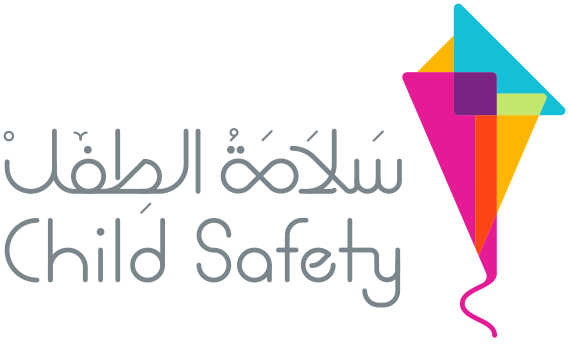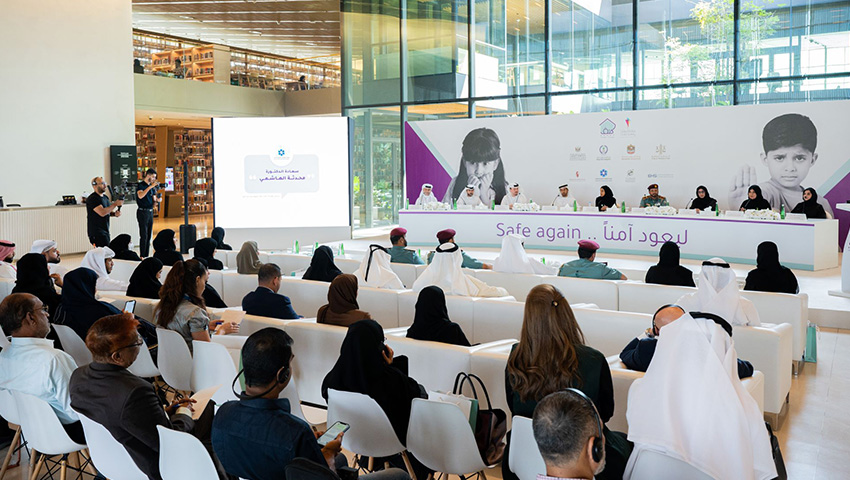Under the patronage of Her Highness Sheikha Jawaher bint Mohammed Al Qasimi, wife of His Highness the Ruler of Sharjah and Chairperson of the Supreme Council for Family Affairs (SCFA), the Child Safety Department (CSD) in Sharjah has announced that Kanaf, its interdisciplinary multi-agency child protection centre, has commenced operations.
Formally established in 2020, Kanaf has led three years of meticulous planning, organisation, and training to enable relevant partnering entities to provide integrated referral and treatment services at its state-of-the-art facility, which is now open. Furthering CSD’s mission to standardise child protection services, Kanaf will offer specialised legal, psychological and social support to young victims of abuse and their guardians in a safe and supportive environment.
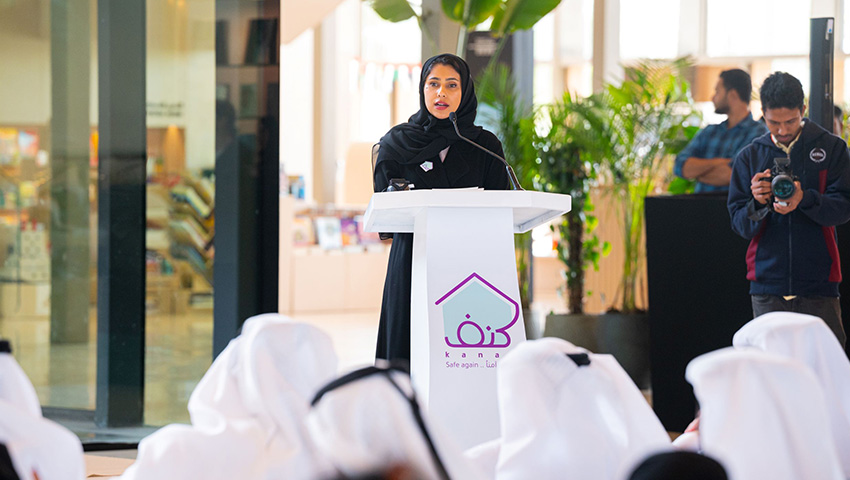
The centre’s opening was announced at a press conference held in Sharjah’s iconic House of Wisdom (HoW) in the presence of HE Hanadi Al Yafei, Director General of CSD and Head of Kanaf’s Higher Committee; and Ameena Al Refaei, Manager of Kanaf. During the conference, Kanaf’s partners outlined their collective efforts to initiate and launch this innovative project, which operates under the slogan ‘Safe Again’, and highlighted their respective roles.
The Higher Committee of Kanaf, including HE Dr. Mohamed Obaid Al Kaabi, Chief of First Instance Court Sharjah; HE Anwar Al Harmoudi, Senior General Attorney of Sharjah Prosecution; Major General Saif Al Zari Al Shamsi, Commander-in-Chief of Sharjah Police; HE Dr. Muhadditha Al Hashimi, Chairperson of the Sharjah Private Education Authority; HE Afaf Ibrahim Al Marri, Chairman of the Sharjah Social Services Department; HE Dr. Safiya Al Khaja, Director of Al Qassimi Women’s and Children’s Hospital; and HE Sheikha Modhi Al Shamsi, Chairperson of the Family Development Department and Branches also attended.
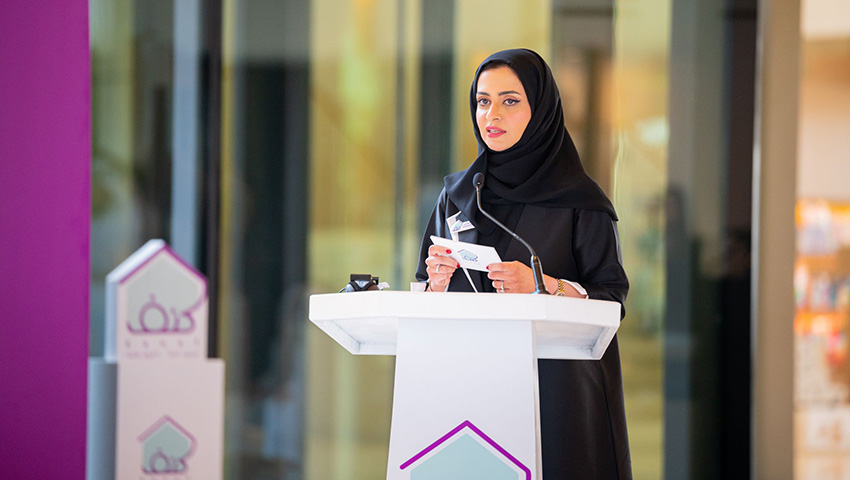
A proactive approach to safeguarding children from abuse
Outlining Kanaf’s overarching mission, HE Hanadi Al Yafei strongly emphasised upon the need for a societal shift towards exhibiting “greater courage” while recognising, addressing and rectifying child abuse. “This responsibility does not allow the slightest margin of error because the rights of innocent children and their futures are directly related”.
“I want to emphasise here that while the creation of such institutions might be in response to negative phenomena prevalent in some societies, here in Sharjah, we work proactively to preempt any potential issues that could harm our community, and prevent it. Even if it is one child who faces abuse, we will go over and beyond to protect them. The number of children who require our services is not the reason Kanaf exists; it is more to do with how important the human right of each child is to enjoying a safe and healthy environment to grow and flourish in,” she added.
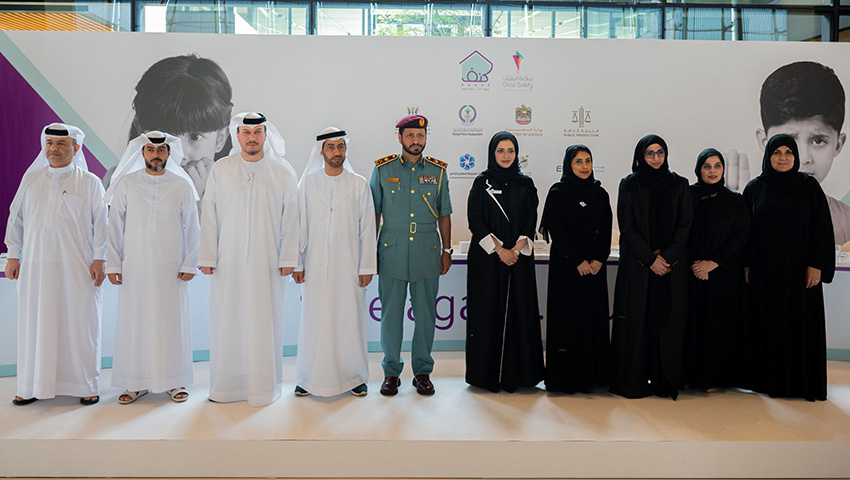
Media collaboration key to Kanaf’s success
Al Yafei turned to local media representatives at the event to stress on the importance of their collaboration with Kanaf to promote their efforts. “There are over 200 nationalities residing in Sharjah and the UAE, and our media messages must cater to the cultural diversity of the nation. We must craft media messages and advisories in a way that families from all socio-cultural backgrounds resonate with and can follow to protect their children”.
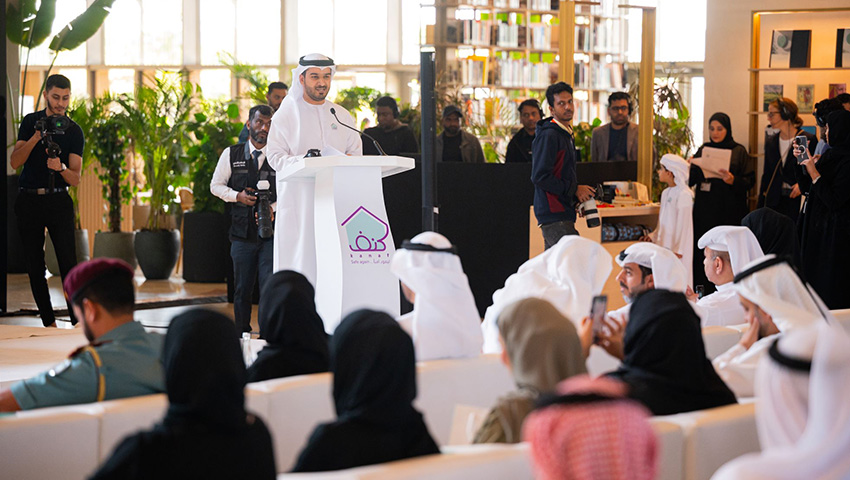
Sharjah’s children are Sharjah’s responsibility, not just Kanaf’s
For her part, Ameena Al Refaei, Manager of Kanaf, emphasised: “When it comes to ensuring the welfare of Sharjah society, which is characterised by a diverse diaspora of children, adolescents, youth and the elderly, it is not one single entity or institution that can ensure that the community’s awareness is strong enough about such issues. It is a collaborative responsibility to be fulfilled equally by both public and private entities. We are guided by a clear vision set by His Highness Sheikh Dr. Sultan bin Mohammed Al Qasimi, Member of the Supreme Council and Ruler of Sharjah. This vision is embodied by Her Highness Sheikha Jawaher Al Qasimi, Chairperson of SCFA, who provides guidance and support, and leads significant initiatives.”
Comprehensive child protection services delivered in six stages
Child protection services offered by Kanaf emulates the Barnahus model, and comprises six specialised stages from reporting to providing psychological support to victims of abuse.
First, a case of abuse must be reported to the Sharjah Social Services Department on their Child Protection Hotline 800700. After listening to the account of abuse, the case is categorised as physical or sexual by Kanaf and its partners. At this stage, Kanaf prepares to receive the abused child and the witnesses thereof.
The second stage, known as ‘Multi-disciplinary meeting’ during which the social worker at Kanaf meets with relevant partners and holds the first case conference. This assessment aims to evaluate the child and review shared data to create treatment plans tailored to the specific case.
The third stage, Forensic Interview, involves assigning a representative from the Mental Health Unit to accompany the authorised person in hearing the child’s account. This stage is designed to gather evidence and clarify the incident. The fourth stage, ‘Forensic Exam ‘ involves the preparation of a report that includes the child’s medical history and the results of a comprehensive physical examination. In cases of suspected sexual abuse, a specialised medical examination is conducted at the centre to detect signs or symptoms and document evidence. A family intervention program is also provided at this stage to help families cope and adapt, as well as treat trauma if family members exhibit signs.
In the fifth stage, a court case is filed after verifying all data, medical examination results, and information obtained during the forensic interview, and the Social Services Department appoints a legal representative for the child. The case file is then referred to the judiciary and closely monitored to ensure the child’s virtual presence at court sessions, accompanied by the legal representative and a representative from the Mental Health Unit.
The sixth and final stage involves providing mental and social therapy. This stage is guided by the child’s mental health history, and a thorough evaluation of the potential impact of abuse. A customised treatment plan is designed to address the needs of the victim and their family members. The plan includes therapeutic and rehabilitative programmes based on best practices.
Partners’ responsibilities and tasks
In addition to CSD, which coordinates and manages the contributions of various entities, overseeing the child protection system through the preparation of periodic reports and statistics, Kanaf is served by nine partnering entities – the Federal Court of First Instance Sharjah, the Public Prosecution in Sharjah, the General Command of Sharjah Police, the Emirates Health Services Establishment, the Emirates Schools Establishment , the Sharjah Social Services Department, the Sharjah Private Education Authority, the Forensic Medicine Department, and the Family Development Department and Branches .
All these specialised Sharjah Government departments have set up operations at the Kanaf centre to exclusively serve cases reported at the centre. Together, they form an integrated care system under the umbrella of Kanaf, providing for the needs of child victims all under one roof.
The Sharjah Social Services Department is tasked with receiving and recording reports related to child victims through the Child Protection Helpline 800700. They also provide social, psychological, legal, and social care services to protect children. The Emirates Health Services Establishment offers medical support services, conducts comprehensive medical examinations for children, and facilitates complete physical recovery.
In cases requiring further examination, the Forensic Medicine Department at the Ministry of Justice conducts forensic examinations for the child upon the prosecution’s request and prepares a report of the results. The General Command of Sharjah Police is tasked with any necessary measures to ensure the child’s safety, as well as collecting evidence related to any investigation upon the prosecution’s request. Sharjah Public Prosecution is responsible for working alongside the judiciary in Sharjah to handle child abuse cases, ensuring compliance with prosecution procedures. They provide hospital reports, necessary investigations, and forensic examinations if required. The Federal Court of First Instance ensures adherence to the law, reaching a fair judgement, and protecting the rights of individuals and families according to national standards.
Kanaf’s responsibilities extend beyond health and legal aspects to include social care and education. The Family Development Department and branches, an affiliate of theSCFA, provides consultations for families and parents of child abuse victims, guiding them on the best ways to address the child’s psychological and emotional consequences. The Emirates Schools Establishment and the Sharjah Private Education Authority ensure the child’s safety in academic institutions such as schools and nurseries. They also offer advice and various support services for children and abuse victims, enabling them to continue their educational journey.
The press conference concluded with Kanaf expressing their gratitude towards the Sharjah Municipality for its significant support, emphasising that it will offer local institutions and members of the community a strong incentive to promote Kanaf’s efforts to protect children.
